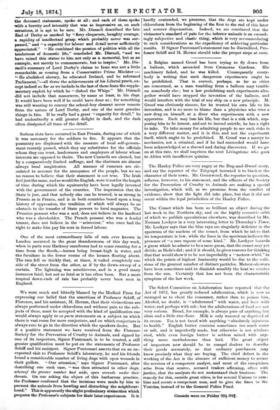Serious riots have occurred in East Prussia, during one of
which it was necessary for the soldiers to fire. It appears that the peasantry are displeased with the measure of local self-govern- ment recently passed, which they say substitutes for the officials whom they can trust, landowners and employers of labour whose interests are opposed to theirs. The new Councils are elected, but by a comparatively limited suffrage, and the chairmen are almost always local magistrates. All manner of rumours are cir- culated to account for the annoyance of the people, but we see no reason to believe that their statement is not true. The Irish feel just the same, and so would the English, were it notfor the length of time during which the squirearchy have been legally invested with the government of the counties. The impression that the State is just, and that nobody else can be trusted, is as strong in Prussia as in France, and is in both countries based upon a long history of oppression, the tradition of which will always be an sobstacle to the transfer of State powers to local magnates. The Prussian peasant who was a serf, does not believe in the landlord who was a slaveholder. The French peasant who was a feudal tenant, does not believe in the "aristocrat," who once had the right to make him pay his rent in forced labour.


































 Previous page
Previous page